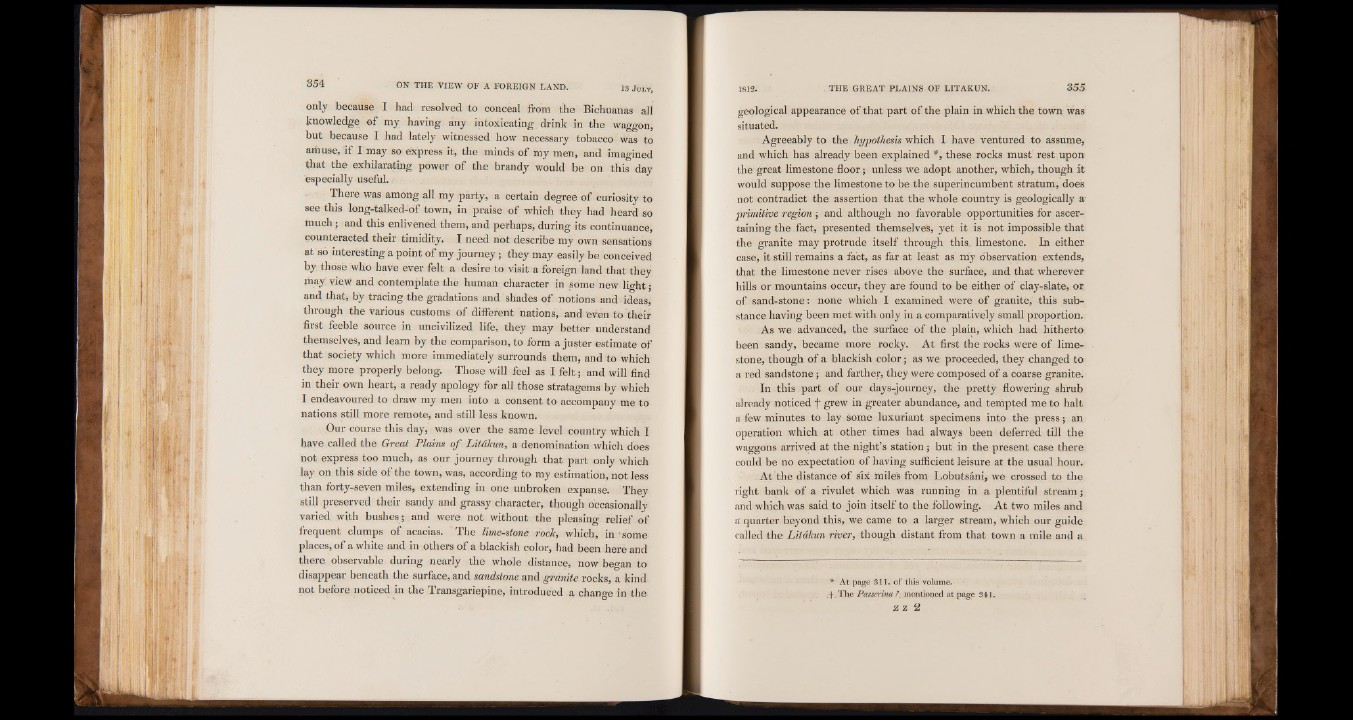
only because I had resolved to conceal from the Bichuanas all
knowledge of my having any intoxicating drink in the waggon,
but because I had lately witnessed how necessary tobacco was to
amuse, if I may so express it, the minds of my men, and imagined
that the exhilarating power of the brandy would be on this day
especially useful.
There was among all my party, a certain degree of curiosity to
see this long-talked-of town, in praise of which they had heard so
much; and this enlivened them, and perhaps, during its continuance,
counteracted their timidity. I need not describe my own sensations
at so interesting a point of my journey; they may easily be conceived
by those who have ever felt a desire to visit a foreign land that they
may view and contemplate the human character in some new light;
and that, by tracing the gradations and shades of notions and ideas,
through the various customs of different nations, and even to their
first feeble source in uncivilized life, they may better understand
themselves, and learn by the comparison, to form a juster estimate of
that society which more immediately surrounds them, and to which
they more properly belong. Those will feel as I felt; and will find
in their own heart, a ready apology for all those stratagems by which
I endeavoured to draw my men into a consent to accompany me to
nations still more remote, and still less known.
Our course this day, was over the same level country which I
have called the Great Plains of Litakun, a denomination which does
not express too much, as our journey through that part only which
lay on this side of the town, was, according to my estimation, not less
than forty-seven miles, extending in one unbroken expanse. They
still preserved their sandy and grassy character, though occasionally
varied with bushes ; and were not without the pleasing relief of
frequent clumps of acacias. The limestone rock, which, in some
places, of a white and in others of a blackish color, had been here and
there observable during nearly the whole distance, now began to
disappear beneath the surface, and sandstone and granite rocks, a kind
not before noticed in the Transgariepine, introduced a change in the
geological appearance of that part of the plain in which the town was
situated.
Agreeably to the hypothesis which I have ventured to assume,
and which has already been explained *, these rocks must rest upon
the great limestone floor; unless we adopt another, which, though it
would suppose the limestone to be the superincumbent stratum, does
not contradict the assertion that the whole country is geologically a
primitive region ; and although no favorable opportunities for ascertaining
the Tact, presented themselves, yet it is not impossible that
the granite may protrude itself through this, limestone. In either
case, it still remains a fact, as far at least as my observation extends,
that the limestone never rises above the surface, and that wherever
hills or mountains occur, they are found to be either of clay-slate, or
of sand-stone: none which I examined were of granite, this substance
having been met with only in a comparatively small proportion.
.As we advanced, the surface of the plain, which had hitherto
been sandy, became more rocky. At first the rocks were of limestone,
though of a blackish color; as we proceeded, they changed to
a red sandstone ; and farther, they were composed of a coarse granite.
In this part of our days-journey, the pretty flowering shrub
already noticed f grew in greater abundance, and tempted me to halt
a few minutes to lay some luxuriant specimens into the press; an
operation which at other times had always been deferred till the
Waggons arrived at the night’s station ; but in the present case there
could be no expectation of having sufficient leisure at the usual hour.
.A t the distance of six miles from Lobutsani, we crossed to the
right bank of a rivulet which was running in a plentiful stream;
and which was said to join itself to the following. At two miles and
a quarter beyond this, we came to a larger stream, which our guide
called the Litakun river, though distant from that town a mile and a
* At page 311. of this volume.
:f.Th.e Pas$erina ?_ mentioned at page 34-1.
z z 2